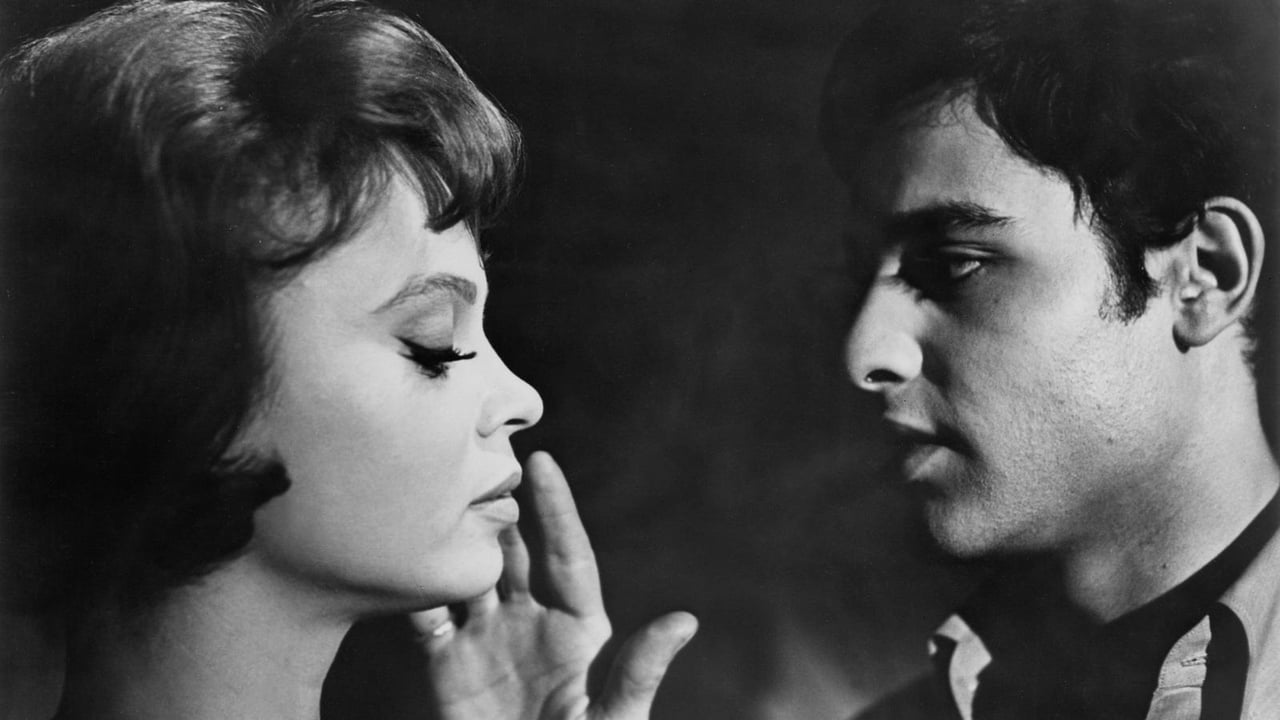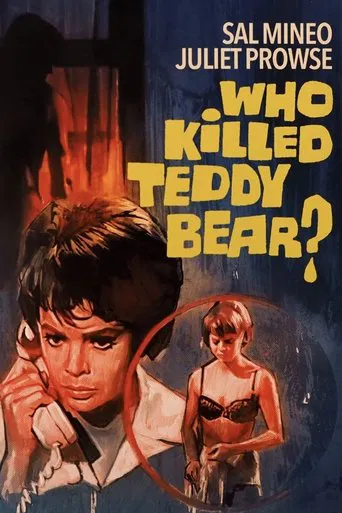

That was an excellent one.
... View MoreSadly Over-hyped
... View MoreThere is definitely an excellent idea hidden in the background of the film. Unfortunately, it's difficult to find it.
... View MoreIt is encouraging that the film ends so strongly.Otherwise, it wouldn't have been a particularly memorable film
... View MoreAlthough the Italian giallo officially dates from Mario Bava's 'Blood and Black Lace' (1964), the genre didn't bloom until the early seventies; with the unfortunate result that they are indelibly associated for this viewer with ugly colour and even uglier clothes and haircuts. 'Who Killed Teddy Bear' gives an interesting glimpse of what gialli would have looked like had they been made just a few years earlier when a modicum of taste still prevailed, and male dress sense (an oxymoron if ever there was one after the late sixties) hadn't yet been wrecked by the bizarre notion that flares and sideburns looked cool, and sharp suits, thin ties and short back and sides were still standard male apparel (it's nice to see Dan Travanty (sic) and Bruce Glover, for example, looking so young and clean-cut; the former playing a deaf mute, the latter an unnerving security adviser). That goes for the women too: I've never seen Elaine Stritch look more chic and glamorous than she does as the elegant lipstick lesbian she plays here.Most of the conventions of the giallo are present and correct in this movie: including voyeurism, transvestism, flashbacks depicting childhood sexual traumas, the stalking of women, weird camera angles making us complicit with the killer, obtrusive musical accompaniment and cops who make the Keystone Kops look like Maigret (the unprofessional way the detective behaves at the end has to be seen to be believed!). But 'Who Killed Teddy Bear' could only have been made at that fault-line in the mid-sixties when censorship was being rapidly eroded and subjects that would have been absolutely taboo just a couple of years earlier could even be hinted at; but before the descent into full-frontal crudity that makes so much modern cinema almost unwatchable. The script is liberally sprinkled with words like "pervert" and "hooker", for example; but there's no swearing. And of course - although no one had any inkling of this at the time - it was made just at the moment that the black-&-white feature film as the cinema's default setting was on the verge of disappearing forever. Six years earlier cameraman Joseph Brun had shot one of the most breathtaking black-&-white features ever made, Robert Wise's 'Odds Against Tomorrow' (1959); so when I saw his name on the (extremely stylishly designed) credits I knew I was in for something special.
... View MoreWhen I saw this movie the first time I was blown away. The movie itself is filmed in Black and White using a softener in some scenes to make the picture look very dreamy. The cast is great and the movie works so great with the act of Sal Mineo. He is such a good dancer and can play someone really sweet and innocent but also be very scary and hard. To bad the movie is hard to find on DVD or VHS, but there is a British DVD available now. Its also fun to see that the film was made with low budged, in the nightclub there is always exact the same music and the same people dancing. Doesn't matter what day it is. But because the movie didn't had a big budged it feels authentic and real! Everybody who wants to see a great black and white movie with intelligent story, very good acting and sexy Sal Mineo should watch this one...
... View MoreHard to believe and very sad to realize that we are coming close to the 30th anniversary of the death, in February-1976,of the brilliant, beautiful, enigmatic, and influential talent of Sal Mineo. He was one of the original 50's heartthrobs who debuted with his poetic performance in the now legendary James Dean classic, Rebel Without a Cause. Later, Mineo became known for his talent and his courage in his art and in his life. He would tackle much more difficult roles and become the first actor to declare his homosexuality, unapologetically. Teddy Bear is Mineo at his most brilliant, most haunting, most daring and most heartbreaking. Coming at a time in his career when he was frustrated with very little roles to choose from, came this harrowing film from director Joseph Cates. It is important to note, and upsetting to say that Teddy Bear is mostly regarded as a "cult classic" and sometimes viewed as a late night schlock/camp film. Nothing could be further from the truth. Here is a film that was not only ahead of its time in subject matter, as well as actors pushing the envelope, but also influencing Martin Scorsese's Taxi Driver(1976) and Alan J. Pakula's Klute (1971).First, it is important to note how much "Teddy Bear" resembles the great Italian films from the late '50's, early'60's. Another great feat for Joseph Cates, is showing the remarkable influence from Michaelangelo Antonioni's L'Eclisse. This is another film dealing with the issues of disillusionment with life and society. Antonioni films Italy as though the surroundings of the characters are being consumed by their environment, a constant theme in Cates' Teddy Bear. Even more remarkable, one can see similarities between Monica Vitti in L'Eclisse and Sal Mineo in Teddy Bear. Both actors never indicating, but truly feeling the confusion, the sadness, and despair with their lives and what they have amounted to. Cates is the one director who beat all others to the punch before imitation of Italian cinema in America became the norm. Joseph Cates dared to show New York as it sadly sometimes can be, a dark, hedonistic, and self absorbed web of sex, self satisfaction and ultimately personal confusion turning to crisis. And he found the perfect actor to personify this as well in the form of the lead character. Mineo never compromises from film's beginning to end. It is a performance of the kind James Dean would have probably played had he lived. And Mineo plays it with all of the same courage, energy and longing that James Dean himself did in Kazan's East of Eden. Alas, Mineo himself had surpassed Dean in some ways with this performance and still, it is ignored. By watching Mineo in this performance, one sees the influence for Robert De Niro's historic Travis Bickle character. A decade earlier Mineo created a character who becomes a victim of an uncaring society, sexual disfunciton and a New York spiraling into hell. Mineo's character certainly would have made movie legend, like DeNiro had done with Driver, if Teddy Bear had been accepted by theatergoers in the first place. Joseph Cates' brilliant directing is overlooked as well. One is reminded of Scorsece's Taxi Driver throughout. The parallels are very easy to see. Cates had made the first movie to address some very upsetting and complicated issues that apparently no one wanted to see on the screen in 1965. Cates treats each character it seems as though they have lost all sensiblility in some cases and are detached from any kind of emotion. Sadly, when each character comes close to any kind of connection, they become even more bitter or face a confusion they can't comprehend or would even want to. Cates also did a brilliant job in creating the other characters through through the other actors in the film. Juliet Prowse as a jaded but still hopeful actress who desperately seeks independence. Jan Murrey as a soul sick cop. And last but not least, the stunning,incandescent Elaine Stritch who steals every scene that she's in and showing a vulnerability and human frailty that would still surprise people in 2006. Teddy Bear has yet to be available on DVD in wide release. It is the last in a series of insults to Cates' vision and Sal Mineo's heartbreaking talent. How soon we forget and overlook an actor of such talent, grace and beauty as Sal Mineo. After seeing his shattering performance in Who Killed Teddy Bear he will be even more greatly missed.
... View MoreRead Son of Cathode's review as he has it right about this great piece of film making that has somehow gone mostly unnoticed by those that fancy dark and gritty films. This film delivers in spades and in my final estimation, I can only add to what others have said before me in saying this was way ahead of it's time when one considers technique.However, if this was attempted to have been made let's say in 1976 as opposed in 1965, it might of lost something in capturing the gritty underbelly which was somewhat different than the gritty style of a decade earlier and the finished product might have been too slick and obvious for 1976. I'm glad that the film makers were bold enough to have taken on such a project when they did it in 1965 and this film stands as a testament to their boldness. Look online at some of the big online auctions and you can commonly find this title now days for under 20 bucks and well worth it as this is a must see film for those who REALLY like the noir style.
... View More